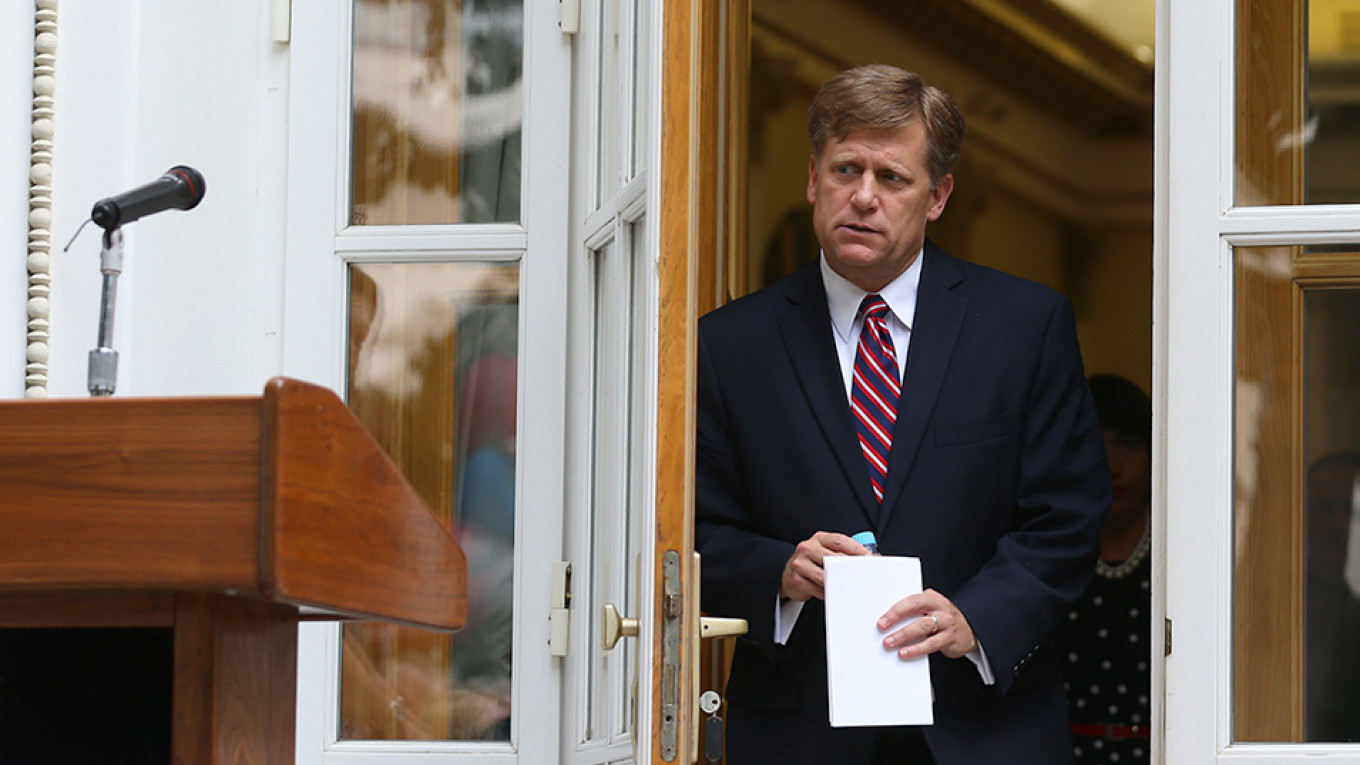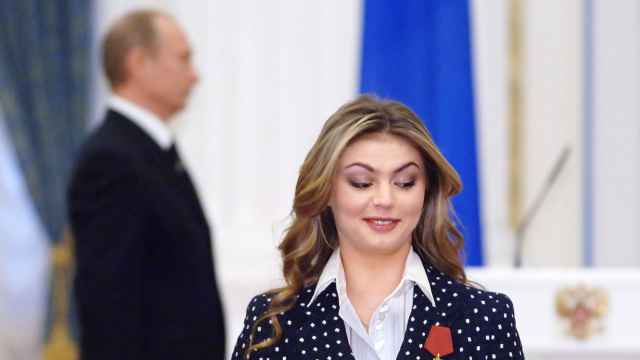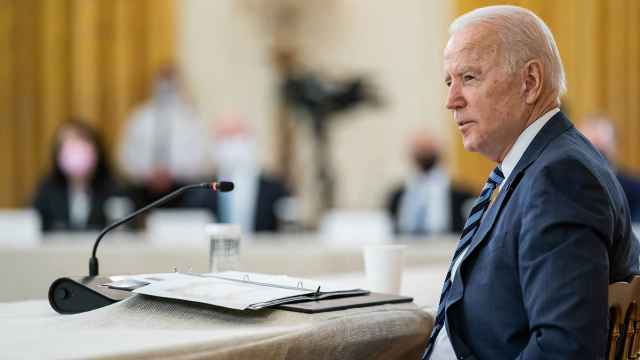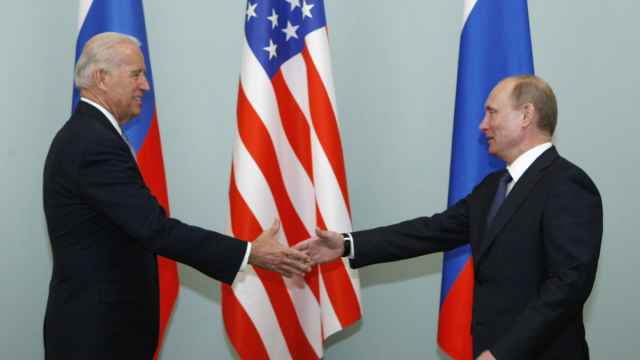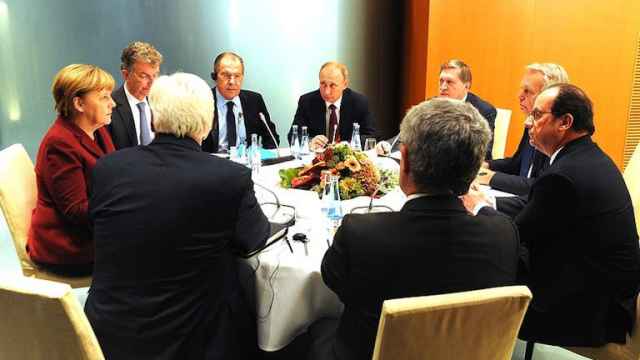Former U.S. ambassador to Russia Michael McFaul believes President Vladimir Putin is fighting against the tide of history and that Russian society will not “tolerate disenfranchisement and oppression forever.”
In an interview with The Moscow Times touching on topics from Putin through sanctions to arms treaties, Barack Obama’s former man in Moscow said it would be “crazy” to think the current Russian political system can survive the next 20 years.
“The history of autocracies is pretty clear — oppression can work for a long-time, but it can’t work forever,” McFaul said from his Stanford University office in California, where he is now a professor of international relations.
“Russians are too smart, too wealthy and too connected to the outside world to tolerate disenfranchisement and oppression forever. History is on the side of those who want to see Russia return to being a normal, boring, democratic European country.”
McFaul, who crafted the U.S.-Russia “reset” under Barack Obama before serving as ambassador from 2012 to 2014 is now banned from travelling to Russia under Kremlin sanctions — the first former U.S. ambassador in 60 years to be blocked from entering the country.
During his time in Moscow — which saw the return of Vladimir Putin to the presidency, an escalation in the Kremlin crack-down on independent opposition and civil society and a souring of U.S.-Russia relations — McFaul was regularly attacked by Russian state media, who said the ambassador had been sent to Russia to “foment revolution.”
Such attacks, which Mc Faul says “continue to this day,” seem only to have emboldened his belief in Russia’s democratic future.
“Before revolutions occur, they seem impossible, and after they occur, they seem inevitable. That underscores how bad we are at predicting these kind of events, but it also underscores that democracies are the most stable systems of government,” he said
McFaul added that autocracies can last for a long time, citing the example of the Chinese Communist Party, which just surpassed the Soviet Communist Party in the length of its grip on power, “but history is against them … they tend to topple at some point along the way.”
In a sign of the anti-Russia consensus in Washington following the annexation of Crimea, war in eastern Ukraine, downing of Malaysian Airlines flight MH17, and interference in the 2016 U.S. election, Democrat McFaul said he backs the Trump administration’s policy towards Russia. He cited the provision of lethal military aid to Ukraine and the extension of sanctions as key achievements.
Now, he says, Trump’s top priority should be to secure an extension to the New Strategic Arms Reduction Treaty (New START) — the Obama-era deal due to expire in February 2021 which limits both countries’ nuclear arsenals.
“It would be a giant mistake for my government to let that treaty lapse, and if I could recommend just one thing that the Kremlin and Washington seek to achieve before the end of the Trump administration — or at least the first term of the administration — it would be to extend that treaty for five years,” McFaul said.
Turning to sanctions, McFaul pushed back against those who say the West’s response has been ineffective.
“This notion gets rolled out sometimes that sanctions don’t work. Well, sometimes you have to respond, irrespective of the behavior you’re seeking to change. When there is belligerent behavior in the international system — in this case the annexation of territory — there have to be consequences. To not respond ... would just encourage it all the more.”
Nevertheless, he understands the concerns of U.S. businesses who may be affected by the measures, and urges them to start publicly criticising the Kremlin’s foreign policy, and not just lobbying Washington, if they want to see restrictions eased or removed.
“They should raise it with the U.S. administration, but they should really raise it with the Kremlin,” McFaul said. “In my view [businesses] should play a much more vocal role — maybe they are privately — pressuring the Kremlin to rethink their policies, which I believe don’t hurt just American businesses, but hurt the Russian people.
“If Mr. Putin would change his behavior, then the U.S. and the EU would lift sanctions. The ball is in Putin’s court, not in Washington’s.”
The U.S. is currently without an envoy in Moscow following the departure of Jon Huntsman, who branded his two year stint as a “historically difficult period in bilateral relations.” Trump is set to formally nominate deputy secretary of state John Sullivan as Huntsman’s replacement.
McFaul said he is pessimistic on the chances of a quick turnaround in U.S.-Russia relations whoever occupies Spaso House, the official residence of the U.S. ambassador in Moscow. He even cautioned the incoming ambassador against trying to improve U.S-Russia ties without good reason.
“It’s a huge mistake of diplomats and those who observe them, to think that ‘improving relations’ or ‘befriending the regime’ is the job of an ambassador. That’s not the job of an ambassador,” he said.
Now back in his native academia, McFaul prefers to look toward a long-term horizon. Refusing to offer a prediction on what might happen when Putin’s current term in office ends in 2024, he asks: “Which is the crazier prediction: that 20 years from now, Putinism, as we see it today, will still be in place? Or that 20 years from now, something else will have come along to replace the regime and this system of government?”
“I think the first prediction is the crazy one. I say that thinking about autocracies generally, but also thinking about what people said about Stalinism in 1953 — only three years [later] there was a radical change to that system. Then under Brezhnev, people said that it would never change — a mere five years later, the entire system collapsed.”
“Those that predict stability should be reminded about how wrong they’ve been.”
A Message from The Moscow Times:
Dear readers,
We are facing unprecedented challenges. Russia's Prosecutor General's Office has designated The Moscow Times as an "undesirable" organization, criminalizing our work and putting our staff at risk of prosecution. This follows our earlier unjust labeling as a "foreign agent."
These actions are direct attempts to silence independent journalism in Russia. The authorities claim our work "discredits the decisions of the Russian leadership." We see things differently: we strive to provide accurate, unbiased reporting on Russia.
We, the journalists of The Moscow Times, refuse to be silenced. But to continue our work, we need your help.
Your support, no matter how small, makes a world of difference. If you can, please support us monthly starting from just $2. It's quick to set up, and every contribution makes a significant impact.
By supporting The Moscow Times, you're defending open, independent journalism in the face of repression. Thank you for standing with us.
Remind me later.



